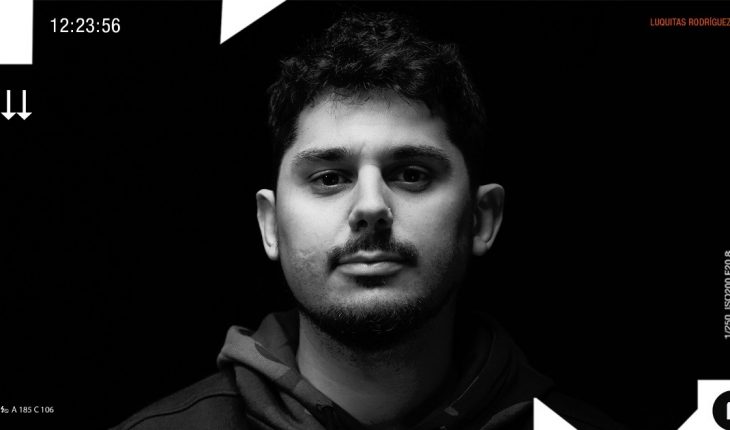Rodriguez Galati, Twitch, cinema, Ankara and theory. Luquitas Rodríguez, who lands on the armchairs of Caja Negra, the filo.news interview cycle hosted by Julio Leiva, is all that and more. After breaking the ice, Luquitas gets on the other side of the film and answers what it is that gives him grace. “I’m amused by a lot of things, but what gives me the most grace are little details of things. They make me laugh at the big things too. Or a joke, which is something that is notoriously, supposedly funny. But those little things… that someone has the laces untied. That’s what makes me most funny and what I find most pleasure in sharing with people,” he says. And, in that sense, a new characteristic stands out: its role as an observer. “If there was a party, if the world were a party -which it is not-, I would be that person who is in the background watching. I wouldn’t be dancing or anything. I would be looking and judging silently, sadly, the same,” he explains.
That has a lot to do with stand up, but it’s a topic for later. Let’s go to Luquitas’ first job, which was as a cook. “The best thing about working in a kitchen has to do with witnessing the real world.
I left high school – I didn’t go to a school in a Cris Morena novel, far from it, I went to a normal school, but you saw that you finished school and then the real world is different. And, in that sense, working in a kitchen for me was like coming across a reality. I think that’s what served me the most in the kitchen. Surely there are many cooks who have a vocation and they do return. I felt that it wasn’t too much what I was giving in relation to time and what that job gave me,” he confesses. After leaving his job and receiving support from his family, came a big disappointment in his life, which was Argentina’s 4-0 loss to Germany in the 2010 World Cup. Later, already out of work, he began to study Journalism at TEA, where he realized that he is in a third position and that, now, he is on the front page with several journalists paraphrasing “Ankara” and “The Theory” in their stories. He adds: “When I was a kid I wanted to cover a World Cup and then, well, I was doing my things and nowadays I have to be laterally in those places. I understand like anyone who is in this place in the Black Box and so on, that traditional media is in a moment of decline. No, they’re not at their best, but I’m not one of those people who says that digital comes to cleanse everything that traditional media did wrong. I do understand that the media, such as streaming channels and so on, do not have such marked interests or do not have such marked editorial lines. But the logics that led the mainstream media to do what they are today exceed them anywhere.”
In turn, already on Ankara and The Theory, Luquitas says that he releases them and lets them develop alone. That is why there are many people who know that there are many people who call Lionel Messi Ankara, but do not know where he came from. He, anyway, doesn’t care. Why? Because, taking up the first few questions, he only looks for fun in little things. Let what has to happen afterwards.” There is an account of a Catalan reporter that the Getafe goal, the one that looks like Diego’s, says ‘Face Messi’ and it made me funny. That’s what makes me most funny in life. And I started saying ‘Ankara, Ankara’, I saw that the same thing started to add up with the theory and Ankara as well. There’s a moment of mine as a total fireman, it’s the
moment of: ‘Dale, come on, come on, come on. I put meat on the grill, huh?’ And well, a lot came. I was lucky that Argentina was the champion and Ankara won,” he says. Then came Rober Galati and the comic duo he formed with him and made himself known, but much more from his Twitch channel, the project that reflects his most authentic side, according to him. “Streaming is a lot like me, because it’s absolutely personal and the chat makes me really laugh. I don’t know the kids in the chat, but I like them. I could go to lunch tomorrow even not only because we laugh, but because of the way we think, because it is also not a philosophy class by any means, but many times we also talk about truth. Or when you watch a movie and analyze a movie. And I like that, I like to have found interlocutors on the other side who feel questioned. That’s why I’m interested,” he explains.
Today, Luquitas lives an unimaginable present, but what about his future? What does it look like twenty years from now? So contesta: “Having a child with my girlfriend, having one. Be calm, working less. Keep making people laugh, keep making you laugh from somewhere. But. But yes, yes, yes, follow. I’ll keep going. I feel like I’m doing well. I don’t know what this can stop at. I started doing a course. That course went on. I ended up acting.
I started making videos. The videos worked and I started streaming. I don’t know what can happen.” And if we go the black box of his life, what is the memory that makes him Luquitas Rodríguez?” I think the biggest formative aspect of all this we’re talking about has been cinema. I think it’s been cinema. I don’t think this is mine. But I’m sorry. It would be something completely different and I feel that way. I feel that cinema is one of my formative guidelines, of the many that one has”. Towards the end of the interview the box opens. An unexpected challenge begins. Week by week a figure will submit to the living room to dialogue and reflect. And you, do you dare to remember what moment made a click in your life?





